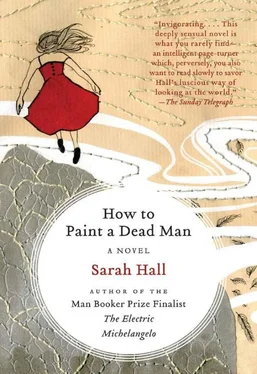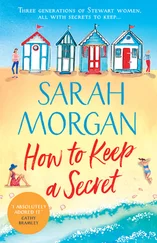Sarah Hall - How to Paint a Dead Man
Здесь есть возможность читать онлайн «Sarah Hall - How to Paint a Dead Man» весь текст электронной книги совершенно бесплатно (целиком полную версию без сокращений). В некоторых случаях можно слушать аудио, скачать через торрент в формате fb2 и присутствует краткое содержание. Год выпуска: 2009, Издательство: Harper Perennial, Жанр: Современная проза, на английском языке. Описание произведения, (предисловие) а так же отзывы посетителей доступны на портале библиотеки ЛибКат.
- Название:How to Paint a Dead Man
- Автор:
- Издательство:Harper Perennial
- Жанр:
- Год:2009
- ISBN:нет данных
- Рейтинг книги:4 / 5. Голосов: 1
-
Избранное:Добавить в избранное
- Отзывы:
-
Ваша оценка:
- 80
- 1
- 2
- 3
- 4
- 5
How to Paint a Dead Man: краткое содержание, описание и аннотация
Предлагаем к чтению аннотацию, описание, краткое содержание или предисловие (зависит от того, что написал сам автор книги «How to Paint a Dead Man»). Если вы не нашли необходимую информацию о книге — напишите в комментариях, мы постараемся отыскать её.
, Sarah Hall, "one of the most significant and exciting of Britain's young novelists" (
), delivers "a maddeningly enticing read... an amazing feat of literary engineering" (
).
How to Paint a Dead Man — читать онлайн бесплатно полную книгу (весь текст) целиком
Ниже представлен текст книги, разбитый по страницам. Система сохранения места последней прочитанной страницы, позволяет с удобством читать онлайн бесплатно книгу «How to Paint a Dead Man», без необходимости каждый раз заново искать на чём Вы остановились. Поставьте закладку, и сможете в любой момент перейти на страницу, на которой закончили чтение.
Интервал:
Закладка:
There was never any damage done in the end. He was considerate. He talked them through it, said goodbye in bed and out of it, let them stay an extra day or two. He remained in contact, a semi-reliable friend, an occasional subsidiser of rent. He was simply Danny, a joker, a drinker, the sweet-hearted, sensitive, un-marrying man. Shallow, but for his depth.
Your parents grew used to meeting one pretty fool-stung girlfriend after another. They got good at temporary welcomes, the remembering of names for bumpings-into at the supermarket and the bank. It was very amicable. Hello, love. Hello, Shelley. Hello, Caroline. Kat. Della. Pamela. Amanda. Clare. Alison. Gillian. Rachel. Freya. Fiona. Lorraine. Rosie. Sharon.
At the flat you waited for Terry to go, then you opened the envelope and unfolded the paper. His handwriting was as bad as ever, made worse by the influence of whatever they had taken, and the idiotic anticipation of tombstoning thirty feet down into pitch-black water. There wasn’t much to read — just three lines. You’d expected a thicker tome, reams of loopy, mushroomy crap scrawled across the page, because it usually took Danny a good few goes to find the meaning in what he was trying to say. Danny had never quite arrived at maturity. You’d assumed that he’d be eternally juvenile and harebrained, and you’d always have the task of dismissing his crackpot notions or humouring him. Danny never quite got to grips with the real world. He always thought things could be knocked together somehow, towed or balanced, spun or floated or flown, when it was obvious to any halfwit that they could not.
Like the time, aged fourteen, he decided to paraglide off Skiddaw using an old sailcloth tied to his belt, and they had to pin his leg in two places at the local infirmary.
Like last year, when he entered the river Eden paddle race, with an oil-drum yacht— The Dirty Sanchez. You and Nathan had tracked his progress from the bank, cheering him on as the kayaks made off downstream. You’d watched him float along at a glacial pace, the various agricultural inflatables bulging below the planking. She’ll pick up speed, he’d reassured you, grinning, she just needs to build up a head of steam. He was wearing flip-flops, a Hawaiian shirt, and blow-up armbands. He’d roped a four-pack of beer to the deck and he pulled it up from the water and opened a can. When the raft ground to a halt in the rapids, Danny had leapt into the water, splashing around and drenching himself, and he’d managing to tug the rusty hull free. The other supporters had laughed and cheered as your brother gave the thumbs-up. Two hundred yards further on the vessel had begun listing badly. People yelled at Danny to abandon ship. In the end it was Nathan who had intervened, heroically jumping off the sandstone bluffs into the water, and helping your brother to tow the sinking Sanchez into an inlet, where she was hastily dismantled. The two of them had swum to the finish line with a tractor tyre floating between them. Then Danny had chased you down, picked you up, and thrown you in the river, as if you were eleven years old again.
You loved this quality about him. His yaw. His silliness. His lovely, lofty profundity. He was a boy with a brain full of gorgeous, ludicrous thoughts, even at the age of thirty-five. He didn’t understand doom. And you so badly wanted him to succeed. Just once. To build his machine, ride the rapids, fly. In Danny you could see a wonkier version of your dad, the progeny of those adventure-inventor Caldicutt chromosomes. When Terry handed you the will, this is what you expected — more of the same. Obscure quotes and hip musical instructions, the desire for sloe poteen to be passed round in some nude forest ceremony. You’d have put good money on it. But you were wrong.
Don’t stick me in the ground. I want Suze to make a big bonfire. Toss me on.
You read it and you felt your heart drop inside its bone cavity. All he wanted in the end was you. It was extraordinary to be reminded in that single moment of who he was and who you were. Compatible birth mates, biological repeaters. Closer than anyone else could ever be to you, and you to he.
You sat on the floor of his flat, now empty and smelling of mildew, and folded and unfolded the note. You read it again. You thought about Dr Dixon and the insects in his aquarium trees, their bodies damp with mucus after crawling from their skins. Say I do, Sue. Say I do. You remembered how as a child you had gradually lost a sense of what Danny was doing in the next-door room — pulling off his socks, watching a spider scuttle, picking his nose. You retuned the channel, started broadcasting on another frequency, clean and static-less and one-way. I, I, I, you repeated, me, me, me.
And you thought about the time Danny had run away. It was at the end of that six-month period of treatment at the clinic. He had slipped out of the cottage and on to the moors one afternoon, and had hidden under a thorn tree. He was upset because you weren’t playing head-talk any more, and he thought you were angry with him. When it became apparent he was missing, you went out with your parents to try to find him. You called his name. You tried to think where he would be — you tried to know where he would be — on the huge brown expanse of the moor. You had never felt so lonely. You had never been so sorry. After what seemed like hours, your dad found him curled under a blackthorn, his arms scratched and bleeding. He was sound asleep. When he was lifted out he woke up. He took your hand. You were forgiven.
Occasionally there were reminders, a residue of some kind. He’d laugh out loud if you were thinking something funny, and say he wanted tuna mayonnaise for his lunch if you had planned on having it. The day you got your first period he seemed aware, if not of the uterine aches, then of some kind of general malaise, because during your next lesson together he handed you a Disprin tablet from the chalky stash of pills he kept in his pencil tin.
You were still siblings, still the Caldicutt twins. But cognitively you went your separate ways. At school you accelerated through academic disciplines while Danny tooled around, arranged local haunted-house tours, scoured the fields and marshes for mushrooms, got into Ecstasy and speed. He formed discordant bands, cycled the Roman roads. After his foundation year, there was never an attempt to make it past amateur artist. He was a craftsman of the ordinary, he said, a plain old smithy. I’m a lesser-bearded Ruskin, a salon-less Courbet. Not a Peter. Not a Suzie. He was happy for you and your dad, proud of the acclaim, the attention, proud too of everything your mum did, her loaves, her scrapbooks, the haircuts she gave him. He was humble, and deeply pleased.
Your silly, soulful brother. The one on the right side of the womb, the one, it turns out, earmarked for extinction. Cut short in his prime, they said at the funeral. Poor Danny, people said, why did it have to be him? Life is so cruel. He got such a raw deal.
But that’s not true. Danny was blessed. He was touched by the hand of a benign deity. He was living the dream, seizing the day. Somehow your brother avoided the solemnity and dross of the modern world. A tap dripped happiness into his temperamental reservoir. There was no lust for money or new things, no lamenting the terrible state of the world and the depravity of humankind. Instead he tracked comet showers, had skinny-dipping parties, read Walt Whitman. He shared flats above chippies and launderettes with old friends from school, worked for minimum wages, saved up to go to Greece and Glastonbury and to get ferries to Man for the races. Then he always came back again. I’m all right here, Suze, he would say to you when you offered to help set him up in the city. This is home. I like it here. Danny with his flat of so few items and his slack wallet. But almost five hundred people turned up to his funeral, from Carlisle, Bowness, and Scotland, from Hexham and London. And didn’t they sing for him.
Читать дальшеИнтервал:
Закладка:
Похожие книги на «How to Paint a Dead Man»
Представляем Вашему вниманию похожие книги на «How to Paint a Dead Man» списком для выбора. Мы отобрали схожую по названию и смыслу литературу в надежде предоставить читателям больше вариантов отыскать новые, интересные, ещё непрочитанные произведения.
Обсуждение, отзывы о книге «How to Paint a Dead Man» и просто собственные мнения читателей. Оставьте ваши комментарии, напишите, что Вы думаете о произведении, его смысле или главных героях. Укажите что конкретно понравилось, а что нет, и почему Вы так считаете.












